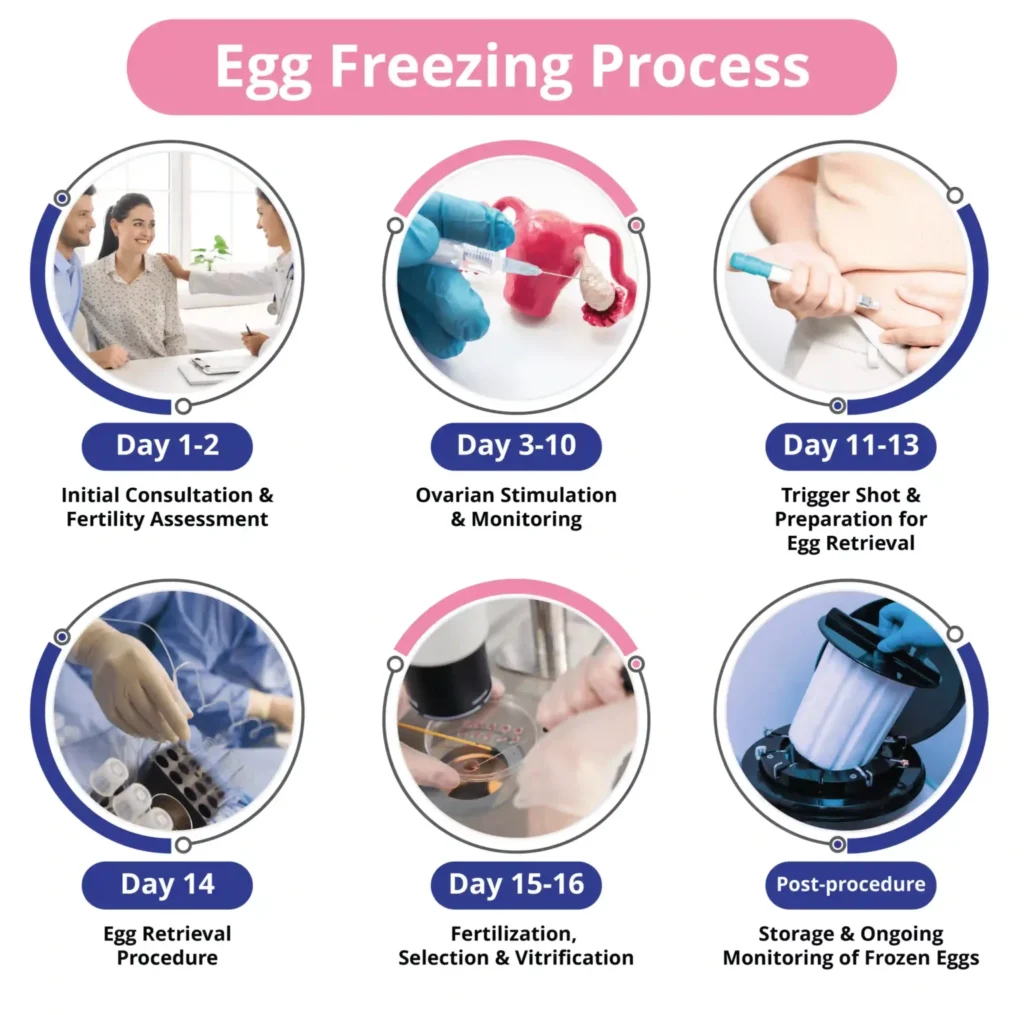For many women, balancing personal and professional goals with the desire for motherhood can be challenging. With age, fertility declines, making conception more difficult. Egg freezing, also known as oocyte cryopreservation, is emerging as a popular option, allowing women to preserve their eggs for future use. This medical advancement provides flexibility and peace of mind, ensuring that women can plan motherhood on their own terms.
What is Egg Freezing?
Egg freezing is a procedure where a woman’s eggs are collected, preserved by freezing, and stored for later use. When she is ready to conceive, the eggs can be thawed, fertilized, and implanted through in vitro fertilization (IVF). Unlike embryo freezing, egg freezing gives women the freedom to use their eggs at a later stage with or without a partner.
Why Do Women Consider Egg Freezing?
Women choose egg freezing for several reasons, including:
• Age and Career Goals: Many women wish to focus on their careers or personal growth before starting a family.
• Medical Conditions: Those undergoing treatments like chemotherapy or radiation, which can impact fertility, may freeze their eggs as a precaution.
• Polycystic Ovary Syndrome (PCOS) or Endometriosis: Women with reproductive health conditions may freeze their eggs to improve their chances of pregnancy later.
• Uncertain Parenthood Plans: Some women haven’t found the right partner but want to keep their fertility options open.
How Successful is Egg Freezing?
Success depends on factors like age at freezing, egg quality, and the number of eggs stored. Studies suggest that:
• Women under 35 have the highest success rates.
• On average, 10–15 frozen eggs offer a 50–60% chance of having a baby.
• Advanced freezing techniques like vitrification improve egg survival after thawing.
However, egg freezing is not a guarantee of pregnancy, and multiple attempts may be needed.
The Egg Freezing Process
The procedure involves four main steps:

1. Ovarian Stimulation: Hormone injections stimulate the ovaries to produce multiple eggs over 10–14 days.
2. Egg Retrieval: Once mature, eggs are collected through a minor surgical procedure under mild anesthesia.
3. Freezing and Storage: The eggs are rapidly frozen using vitrification to prevent damage.
4. Future Use: When ready, the eggs are thawed, fertilized, and implanted through IVF.
How Long Can Eggs Be Stored?
There is no strict limit on how long eggs can remain frozen. Many have been successfully used 10–15 years later. In India, the Indian Council of Medical Research (ICMR) allows egg storage for up to 10 years, with extensions under special circumstances. In the United States and the UK, eggs can be stored for up to 55 years under updated regulations.
Is Egg Freezing Safe?
Yes, it is a generally safe procedure, but potential risks include:
• Hormonal Side Effects: Mild bloating and discomfort from ovarian stimulation.
• Ovarian Hyperstimulation Syndrome (OHSS): Rare but occurs when the body overreacts to fertility medications.
• Egg Survival Rate: Not all eggs survive the freezing and thawing process.
Cost of Egg Freezing in Different Countries
The cost of egg freezing varies significantly based on location, clinic reputation, and additional medical needs.
| Country | Cost Per Cycle (USD) | Medication Costs (USD) | Annual Storage Fees (USD) |
|---|---|---|---|
| USA | $6,000 – $15,000 | $3,000 – $5,000 | $500 – $1,000 |
| UK | $5,000 – $8,000 | $1,500 – $3,000 | $400 – $800 |
| Canada | $5,000 – $7,000 | $2,000 – $4,000 | $300 – $600 |
| India | $1,500 – $3,000 | $500 – $1,500 | $150 – $300 |
| Australia | $6,000 – $10,000 | $2,500 – $4,000 | $500 – $1,000 |
| Singapore | $8,000 – $12,000 | $3,000 – $5,000 | $600 – $1,200 |
| Germany | $4,000 – $6,000 | $2,000 – $3,500 | $350 – $700 |
Some corporate companies now include egg freezing in employee healthcare benefits, making it more accessible.
Recent Advances in Egg Freezing
New research and technology are improving egg freezing success rates. Some recent developments include:
• Better Freezing Techniques: Vitrification increases egg survival rates.
• Genetic Testing: Helps select healthier eggs for better pregnancy outcomes.
• Artificial Intelligence (AI) in IVF: AI-assisted embryo selection improves implantation chances.
According to a 2024 study published in the Journal of Reproductive Medicine, over 85% of frozen eggs now survive thawing, a significant improvement over past techniques.
Final Thoughts
Egg freezing is a breakthrough that gives women the power to plan their futures without the pressure of age-related fertility decline. While it is not a guaranteed solution, it offers hope and flexibility to those looking to extend their reproductive timeline. Consulting a fertility expert is crucial for making an informed decision. With continuous medical advancements, egg freezing is becoming a more viable and accessible option for women worldwide.
References
• Indian Council of Medical Research (ICMR) guidelines on assisted reproductive technology.
• Journal of Reproductive Medicine, 2024 study on egg freezing success rates.
• Reports from leading fertility clinics in India on the cost and procedure of egg freezing.
Also Read About : The One Physiotherapy Trick Every Mom-to-Be Must Know!
Visit Us At : https://g.co/kgs/rTqAjgt





